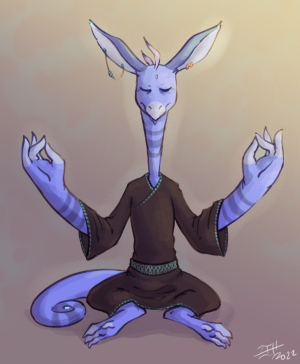
Fuglans
General Information
What would a world be like if reptiles evolved into a sapient species instead of humans? Fuglans (fuuglans) are lizard-like beings that populate the Earth-like planet of Alaruk. Once sharing a common ancestor that lived in trees, fuglans evolved and spread their species across the world to fill various niches and adapt to different environments. Each subspecies is a separate tribe and split into clans, of which some get along better with others.
Average lifespan: 120 years
Average height: 5 feet (150 cm)
Average weight: 100 lbs (45 kg)
Anatomy
Semi-bipedal ectothermic reptilians with long tails, large forearms and opposable thumbs. Their bird-like necks support a head with tall exterior ears and a beak. Their scales can vary in color, depending on the tribe and clan. Physical features also vary across tribes. Fuglan hearing is usually excellent and their range of vision is low ultraviolet to red. As they cannot see in extreme darkness, many subspecies use bioluminescence to navigate in low-light.
Diet
Omnivore, medium-low metabolism. Diet varies with subspecies and environment. Fuglans cannot chew their food and rely on gastroliths. They cannot digest grains or dairy. Their diet may include: Meat, insects, fish, shellfish, eggs, fruit, leafy greens, tubers, flowers, herbs, spices, mushrooms, seaweed, honey, seeds, tree nuts, and algae.
Reproduction
Oviparous. Fuglans lay one egg per clutch per year, with a 50/50 chance of being male or female. They reach adulthood at around 20 years old. Infant mortality rates are low and children may be raised by multiple shared partners with the addition of extended family members.
Culture
Cultures vary between tribes and clans, but for the most part, fuglans tend to be more cooperative and collectivist, rather than competitive and individualistic. Going to war is usually an unfavorable act, as they see mass death and battle as a waste of energy and resources outside of desperate situations. Spiritual warfare is more common, using magic and spirits in place of physical combat.
As fuglans dislike wasting resources, they are conscious about their environment and what they consume and produce. Lifestyles tend to be simple and greed and excess is frowned upon. While biomes become territories for specific tribes, fuglans lack the concept of borders beyond their immediate inhabited space due to many clans adapting nomadic lifestyles. Being prone to fill niches rather than become generalists can have some drawbacks, making particular tribes less versatile in changing climates, but fuglans tend to adapt well to changing biomes over multiple generations with the exception of cold climates.
Technology
Fuglan technology varies between each clan. The most advanced technology places fuglankind at the Chalcolithic Age to Bronze Age with the use of soft metals like copper, zinc, and tin, but most civilizations live in Mesolithic to Neolithic lifestyles with the use of flint, jade, and obsidian tools. Because mining is so laborious and damages the environment, metal is rare and mainly used for jewelry and fine tools. Although their technology is primitive, fuglan inventors are still quite clever and use what they can to their advantage to make life easier, passing down their knowledge to the next generation.
Religion
Rather than worshipping gods, fuglans revere ancestors, spirits, and celestial bodies. Magic is linked to spirituality, using the sun and stars as sources of energy. Shrines and temples are built to honor more powerful spirits and ancestors that were highly respected in life. Fuglan shamans, known as ruksalan, are responsible with speaking directly to spirits and use their magic for healing and protection.
Tribes
Fuglans are split into subspecies known as tribes that populate various biomes. With the overlap of biomes, multiple tribes will make contact with each other to trade and even interbreed.
Aslauk - Hybrids of any two tribes.
Asu - Inhabitants of the sea and coastlines.
Hulesav - Inhabitants of deserts.
Nidez - Inhabitants of caves.
Rekrrasav - Inhabitants of grasslands.
Udlagudruk - Inhabitants of volcanic areas.
Vihrrasav - Inhabitants of wetlands.
Vratinsav - Inhabitants of forests.

A fuuglan ruksala meditating.
Back to Home© Asuune 2023-2025